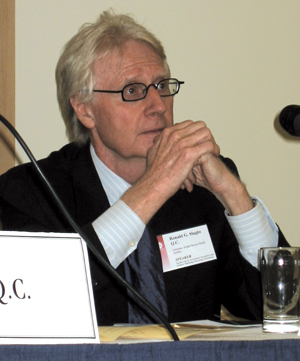Unsuccessful defendants should not be expected to pay an increased costs award to take into account a risk of non-payment to the plaintiffs'' counsel, the Supreme Court of Canada has ruled.

In
Walker v. Ritchie, released Oct. 13, the Supreme Court allowed an appeal to set aside a $192,600 risk premium awarded by the trial judge, which was originally based on the risk of non-payment to the plaintiffs' counsel.
The Supreme Court ruled that "the risk of non-payment to the plaintiffs' lawyer was not a relevant factor under the costs scheme under Rule 57.01(1) of the Rules of Civil Procedure at the time costs were fixed in this case."
Stephanie Walker, plaintiff in the case, was seriously injured in a motor vehicle accident in 1997 and initiated litigation against truck driver Donald Ritchie and his employer, Harold Marcus Ltd. The case proceeded to trial after four years, after which the defendant was found 100-per-cent liable for the accident and the plaintiff and her family were awarded $5,168,317 in damages, plus $577,880 in costs.
Superior Court Justice John Brockenshire also ordered the defendants to pay the plaintiff's trial lawyer a premium of $192,600, as "he found that counsel for the plaintiffs had carried the litigation for four years without remuneration because the plaintiffs could not afford it. Liability was not admitted, and as such, plaintiffs' counsel faced the risk of non-payment."
The risk premium was also unanimously upheld by the Ontario Court of Appeal.
Supreme Court Justice Marshall Rothstein noted in the judgment: "The propriety of a risk premium between lawyer and client is not challenged in this appeal. At issue is whether the plaintiffs' costs award, payable by the unsuccessful defendants, should be increased to take into account the risk of non-payment to the plaintiffs' counsel."
According to the decision, the plaintiffs argued that "risk premiums payable by unsuccessful defendants are required to provide access to justice to impecunious plaintiffs who, even if successful, will receive no or minimal damages given the nature of their case, such as a challenge under the Canadian Charter of Rights and Freedoms."
The Supreme Court rejected this as a justification for risk premiums, as it noted that plaintiffs may qualify for legal aid, receive funds to pursue litigation from a private source, or find counsel to take on the case pro bono.
"While there may be a plaintiff who is unable to secure one of these alternatives, the costs scheme does not aim at perfection," noted Rothstein.
The Supreme Court ruled that the decision applies to the costs scheme in place in Ontario at the time costs were fixed in the case. Since then, the scheme has been modified. For instance, contingency fee arrangements are now allowed.
"The opportunity for counsel to charge his or her own client a risk premium, or now a contingency fee, encourages competent counsel to take on the cases of impecunious plaintiffs. Such a charge is not dependent upon the amount the plaintiff recovers from the opposing party in a costs award," said the decision.
"Unsuccessful defendants should expect to pay similar amounts by way of costs across similar pieces of litigation involving similar conduct and counsel, regardless of what arrangements the particular plaintiff may have concluded with counsel, since a defendant has no knowledge of these private arrangements and thus has no means of measuring the risk of engaging in litigation," noted Rothstein.
According to Andra Maxwell-Baker, of Lerners LLP, counsel for Ritchie and Harold Marcus Ltd., the Supreme Court decision is "significant for litigants in that it's a recognition that there's no sound policy basis for shifting these premiums to defendants and that access to justice has already been achieved by the legislature, permitting contingency fees in Ontario and through the premiums that plaintiffs' counsel are already able to charge their own clients, and that actually there are sound policy reasons against shifting these premiums to defendants.
"We feel that this is a very principled decision based on sound policy that would have application going forward," she said.
Ronald Slaght, of Toronto firm Lenczner Slaght Royce Smith Griffin LLP, counsel for the Walker family, told Law Times that "the real issue is what effect, if any, it will have on the regime going forward because of the contingency fee arrangements which are now permitted and of course, were not formally when this case began.
"I think as a result of the contingency fee arrangement now being in effect, the judgment actually probably will have a limited effect going forward, because lawyers can make their arrangements with their own clients much more easily than they used to be able to do," he added.

 In Walker v. Ritchie, released Oct. 13, the Supreme Court allowed an appeal to set aside a $192,600 risk premium awarded by the trial judge, which was originally based on the risk of non-payment to the plaintiffs' counsel.
In Walker v. Ritchie, released Oct. 13, the Supreme Court allowed an appeal to set aside a $192,600 risk premium awarded by the trial judge, which was originally based on the risk of non-payment to the plaintiffs' counsel.